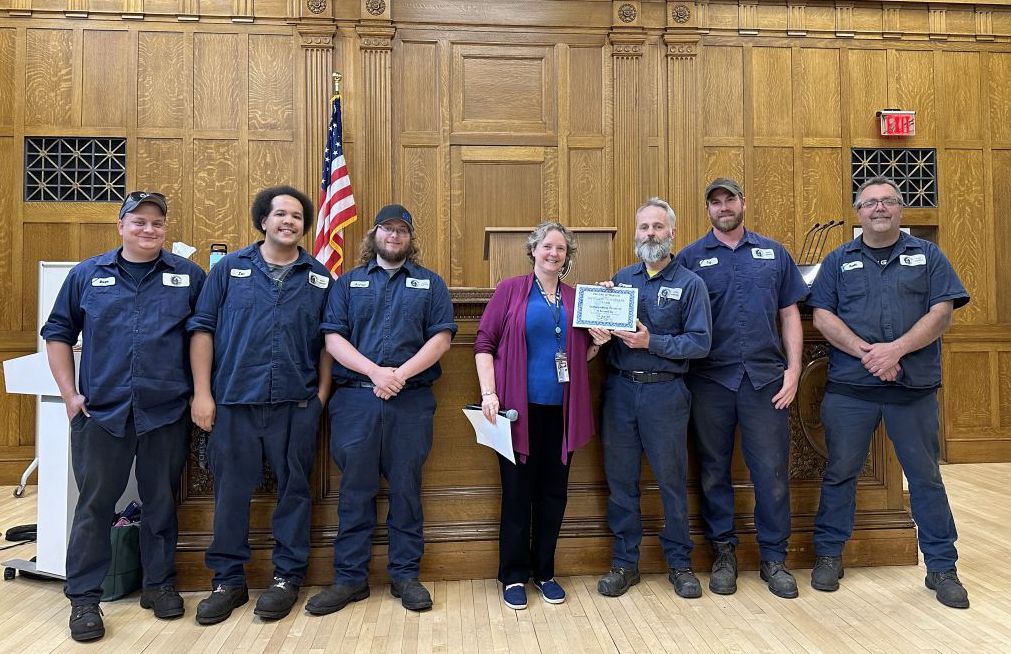Results from the 2022 Fleet Department Survey
posted
By Rachel Darken, Fleet General Supervisor

L to R: Dave Johnson, Ian Jones, Andrew Dalton, Mayor Rhodes-Conway, Andrew Harrison, Jay Hyatt, and Scott Tetzlaff.
In late 2022 and early 2023, Fleet distributed a survey to all employees to gauge their satisfaction working with the department and to gather ideas from each of them on the workplace experience.
Overall, Fleet employees feel generally positive about working here, with employees rating their satisfaction working here an average score of 7.69 out of 10, and their relationships with co-workers at 8.88 out of 10. Training received the lowest satisfaction score, with an average rating of 6.44 out of 10. Safety also remains an area of concern; employees rated the safety of our physical working environment at 8.77 out of 10, and Fleet has a goal of hitting even higher scores in this area. In addition, employees reported being treated differently because of their gender, race, and/or ethnicity. While this mirrors the results of the Workplace Climate survey conducted in 2022 by the Multicultural Affairs Committee and Women’s Initiatives Committee, this is greatly concerning and highlights the importance of Fleet’s Equity Team, which has become very active.
In addition to the written component, with the option of remaining anonymous, two members of Fleet’s leadership team held private, one-on-one meetings with every employee with a goal of getting honest feedback.. These conversations can be broken into seven general themes: Training, Working on Personal Vehicles, Parts Room, Department Leadership, Communication, Waiters, and Schedules.
In April, all Fleet employees gathered in a Town Hall Meeting to review the results of the survey and discuss what the division plans to do to address them. The entire process of this survey required employee participation, and Fleet’s response to the issues raised will be no different. This report is shared widely in order to be transparent about what was heard, and to continue the conversation about what we can do together to make our work environment as positive, productive, and safe as possible.
Quantitative Data
36 surveys were returned. Unless otherwise noted, all questions were scored on a 10 point scale, with 1 being poor and 10 being excellent.
Overall Satisfaction
- Satisfaction Working for the Fleet Division: 7.69
- Satisfaction Working for the City of Madison: 7.94
- Satisfaction with the Training Received: 6.44
- Satisfaction with the Environmental Sustainability Work at Fleet: 7.29
Working Relationships
- Working Relationship with Co-Workers at Fleet: 8.88
- Working Relationship with Supervisor: 8.47
Safety
- Physical Safety in the Working Environment: 8.77
The following questions were answered on a scale of strongly agree to strongly disagree.
- Treated Differently at Work Because of my Gender:
- Agree or Strongly Agree: 19.4%
- Disagree or Strongly Disagree: 72.2%
- Unsure or Blank: 8.3%
- Treated Differently at Work Because of my Race and/or Ethnicity:
- Agree or Strongly Agree: 16.7%
- Disagree or Strongly Disagree: 75%
- Unsure or Blank: 8.3%
Qualitative Data
The number of times each general theme was mentioned is noted in parentheses.
Training (33)
Employees are worried about not receiving the same training opportunities as their colleagues and suggest that training should be standardized. There are also suggestions about the lack of training for newer technologies like electric vehicles and other types of new equipment, as well as standard equipment like DPF systems. Employees also brought up a desire for cross-training, specific training for Parts Technicians, and the need for better training materials. Suggestions include more electric vehicle training, cross-training employees, standardizing the employee onboarding training, and the need for more than just YouTube and Google for training resources.
What we are doing:
- We are taking a close look at the training we require of all new employees and are in the process of overhauling the training program for new Fleet Technicians.
- We would like to provide better support to any employee asked to assist with training new employees, including providing expectations around coaching methods.
- We are committed to finding ways to increase our training budget in the next operating budget cycle in order to provide more opportunities for hands-on training courses.
- Standard trainings for each area within Fleet will be identified (i.e. Parts, Admin, Heavy-Duty equipment, Light-Duty equipment, etc.). These standard training plans will be used for succession planning and cross-training for professional development.
- We will review the training each employee has completed in the last three years to assess any gaps in training opportunities.
- Training needs and ideas should be a regular conversation had between each employee and their supervisor. To that end, we will be asking everyone to rate their confidence in a variety of skills related to their specific jobs as part of the annual employee check-in process, and use that to create a training goal for each employee on a yearly basis, as well as a clearer picture of the training needs department-wide each year.
Working on Personal Vehicles (10)
In 2020, Fleet stopped allowing employees to work on personal vehicles, including those of family members and friends in the Fleet garages. Employees shared this decision negatively impacted morale, especially as private dealerships in our area allow this practice. Furthermore, when Fleet stopped this practice, Fleet Technicians received an increase to their monthly tool allowance but other employees do not qualify for a tool allowance and so did not receive this perceived compensation.
What we are doing:
- Work on personal vehicles in a City facility will not be allowed for the numerous reasons previously communicated, including the cost to power the facility in off-duty hours, safety issues when we cannot guarantee anyone else is present in the building, equity issues, liability issues, and potential situations that would violate City policies and the Code of Ethics.
- The increase to the monthly tool allowance for technicians was first proposed in recognition of the fact Fleet Technicians are required to use their personal tools at work.
Parts Room (9)
Employees shared room for improvement in the Parts room regarding overtime, the distribution of tasks, and lack of control over inventory. Concerns were shared around the need to address the extra workload from overtime snow shifts, as well as the impression some Parts Technicians do more tasks than others. There are also complaints about the general idea that theft was a possibility and the fact that Parts Technicians are responsible for inventory but do not have complete control over it. Suggestions include having a Parts Technician at the counter at all times and having a Parts Technician on the second shift.
What we are doing:
- We started offering overtime shifts to Parts Technicians when we have overtime snow shifts to address the extra workload that results with billed out parts.
- We continue to track and improve the process to request parts. Data is being reviewed in order to inform future decisions.
- We continue to have regular conversations between parts room staff and shop floor staff to identify areas for improvement, develop potential solutions, and test new processes. New ideas are always welcome and encouraged. Reducing friction between the two operations is an ongoing effort.
Department Leadership (7)
Employees shared concerns about the leadership style of the department and the impact of the Superintendent’s actions on the workforce. Some employees feel that the Superintendent in particular does not trust them and shared they feel insignificant. There are also concerns about the detached leadership style of the Superintendent and the impression that he does not understand what technicians are doing. Employees highlighted the importance of positive interactions and suggested that the Superintendent could walk through the whole building regularly to have informal conversations to build relationships.
What we are doing:
- Management has committed to building a stronger foundation of relational trust within the department.
- Fleet will continue to have employees at every level in attendance at each biweekly management meeting, to learn what management is working on and solicit ideas.
- Fleet will continue to have quarterly all-staff meetings to coincide with employee recognition or retirement parties.
- In addition to creating more opportunities within the workday to connect, we would like to offer optional social gatherings outside of work. These will be advertised in advance, and family members and significant others will be welcome as well.
Communication (5)
Employees highlighted issues related to communication and the importance of clear communication. There are concerns about feeling in the dark and the need for improved communication at all levels. It was also noted that miscommunication can lead to backtracking and confusion; an example of this is the initial communication around the night shift premium. Suggestions included sticking to the facts, being transparent, and ensuring that all parties are clear on who is responsible for what.
What we are doing:
- Management is committed to increasing our communication with all employees, and making sure messages are clear and accurate.
- We will work to maintain transparency and provide updates on situations in an effort to clear up misinformation.
- All staff at Fleet now have email accounts, Zoom, and have been issued their own personal device, including tablets for Fleet Technicians in their bays and have been trained in the communications software.
- In addition to our Town Halls and biweekly staff meetings, we would like to meet regularly with each section of the division to provide another avenue for updates and questions.
Waiters (3)
Employees raised concerns regarding the impact of “waiters” (customer department operators walking-in with an issue and waiting while we address it). They shared that waiters can be distracting and that they can negatively impact the quality of their work. There are also concerns surrounding the fact that when technicians are pulled off a larger, complex assignment to address minor jobs, it can be difficult to get back to the original task. Suggestions included possibly having one person as the go-to for waiters, and finding ways to fairly distribute the work among all technicians.
What we are doing:
- In 2023 we have started assigning one technician each week to be responsible for triaging all drop-in work. Technicians will rotate through this assignment.
Schedules (3)
Complaints were shared about the four-hour workday on Fridays, largely citing the environmental impact of commuting for such a short period of work. Employees suggested offering a shift of four 10-hour days for Nakoosa day and night shifts.
What we are doing:
- We are testing a shift of four 10-hour days on the night shift at Nakoosa this summer. We will evaluate the experience to determine if we will offer that shift regularly and incorporate it in other areas of Fleet.
On April 17, 2023, Fleet held an all-hands meeting to specifically address every theme, and discuss what has been going well and what workplace issues could use improvement. This open forum resulted in several changes to the way we do business, we hope for the better. Improvement and change management is constant, and this work is never done for any organization. However, we are pleased with the ideas presented and the progress we have made toward being the best fleet operation we can be for our employees and our customers.
